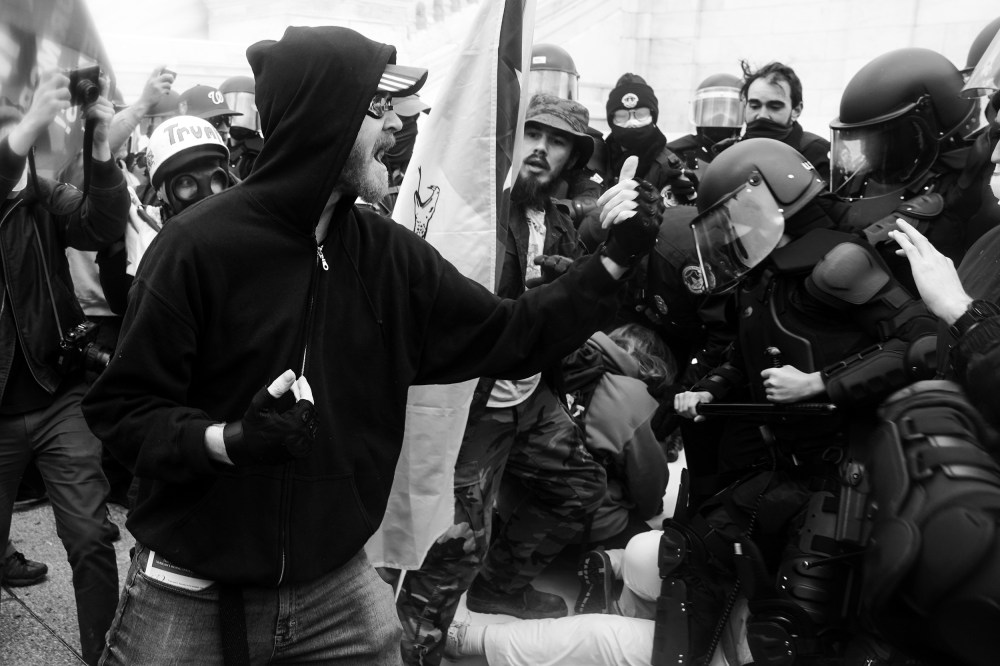For all the ugliness and violence of the Capitol riot this week, the most telling aspect is what we didn’t see happen to those white extremists who threw up the middle finger to our democracy.
They battered through doors and stormed the Capitol. They attacked police officers and desecrated the halls of Congress. They ransacked offices and planted homemade explosive devices near the Capitol grounds. A few insurrectionists even waved the traitor’s flag — the battle flag of the Confederacy, an emblem of white supremacy — in triumph. And they did it all without being shot or beaten on sight.

Let me be clear: I wish death or violence upon no one. But if ever there were a time to expect a government as routinely violent as ours to deploy bullets or batons, I imagine it would be in defense of the most powerful legislative body on the planet. Democracy itself was under attack, and yet the authorities sat on their hands.
Comparatively, Black men and women in America are routinely killed by the state for far less grievous offenses. Violence against Black protesters who condemn those killings is almost a matter of course, an expected and planned-for outcome when too many Black people gather in one place. So why such a difference? How could a riotous, violent mob of whites attack the very heart of our government and our democracy with such little resistance?
It’s a question of citizenship. The bounds and privileges of full citizenship in this country have always been afforded to white Americans, while the much-delayed citizenship of Black Americans has been under constant scrutiny, interrogation and attack in the years since it was legally codified in the 14th Amendment.
This is white privilege weaponized.
White citizenship comes with certain protections, a trust and a belief that the rights laid out in the Constitution apply to you, point blank and period. It’s unquestionable and taken for granted on a daily basis. Meanwhile, Black citizenship, in its fullest sense, remains an aspiration, if not a myth. Law enforcement, in particular, still sees Black people as inherently threatening, not as citizens whose rights are sacrosanct. The perimeters of citizenship have been defined by notions of white supremacy, and those boundaries are constantly reinforced. The disparate treatment of white and Black protesters, agitators or rioters is just one consistent example.
During Wednesday’s attempted coup, some in the mob held signs that read “Liberty or Death,” and we know for damn sure that had that mostly white horde been Black, they likely would’ve been given as close to the latter as deemed acceptable in the moment.
That’s not hyperbole. Over the summer, in the wake of killings of Black people by police, Black protesters from Miami to Minneapolis were met with weapons drawn and tear gas deployed for the sins of blocking streets, breaking curfew and gathering without proper permits. We saw the same thing after the killing of Michael Brown in Ferguson, Missouri, where police in riot gear clashed with protesters nightly over rules that forbade protesters from literally standing still on the sidewalk. Some variation of that kind of heavy-handed response against Black protesters has played out in almost every uprising from then until the agitation in response to the deaths of Breonna Taylor and George Floyd last year.
Yet, instead of the kind of state-sanctioned violence by police in the last seven months, white rioters at the Capitol were treated like patriots rather than thugs. Some officers were seen taking selfies with rioters. Others were recorded calmly stepping away from the gates to the grounds as President Donald Trump’s loyalists streamed through. And even after the worst of the violence inside of the building settled, video captured officers holding open doors and peacefully ushering out the rioters.
This is white privilege weaponized.
Violent white mobs have long been granted a special, almost sovereign space in American politics. After the fall of slavery and the promise of full citizenship for Black people under Reconstruction, white terrorist mobs attacked Black people and the democratic institutions they’d plugged into.













